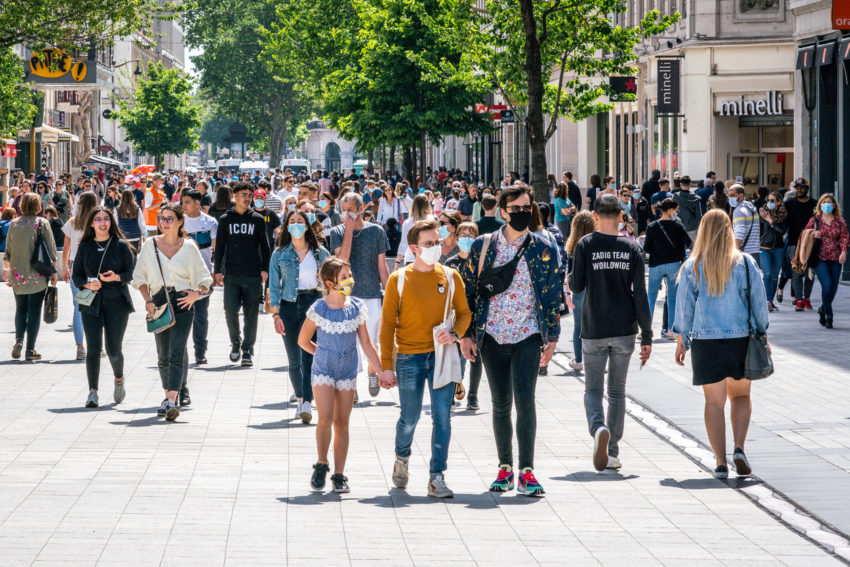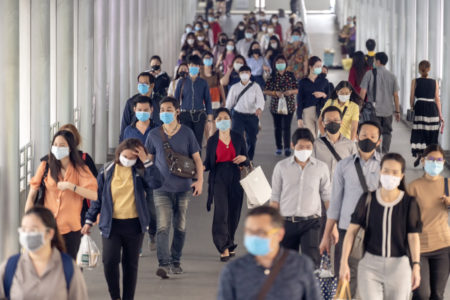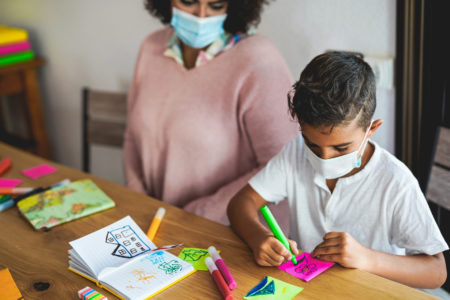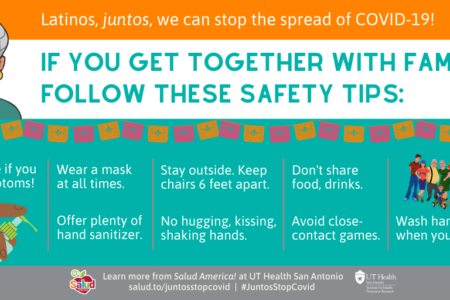
Share On Social!
The United States continues to see record-high rates of new coronavirus cases for a single day.
The majority of those infected—a single-day record 144,000 new cases on Nov. 11 after a then-record 136,000 cases on Nov. 10 and 125,000 new cases on Nov. 6—come from the Latino community.
Worse, that community has also experienced the pandemic’s harshest outcomes, including economic impacts, social upheaval, and, most significantly, mortality rates.
The hard data, which illustrates the unthinkable disparities hurting people of color amid COVID-19, should aptly illustrate these problems, according to Dr. Rogelio Sáenz, a professor of demography at the University of Texas at San Antonio.
“One thing is certain,” Sáenz writes in a recent piece for Poynter. “Americans of color are much more likely than white Americans to contract the virus and to die from COVID-19. My analysis of the latest provisional data from the Centers for Disease Control and Prevention shows that after adjusting for age differences, Black Americans and Latinos are dying at rates 3.2 times higher than white Americans, and American Indians and Alaska Natives are dying at rates 2.6 times higher.
“Put simply, white Americans have a shield that protects them from succumbing to COVID-19.”
Update 12/2/20: “The total number of coronavirus cases in the United States for November surpassed four million on Saturday, more than double the record set in October of 1.9 million cases,” according to The New York Times.
Latinos’ Struggle Months into COVID-19 Pandemic
The different COVID-19 experiences among people of color compared to their white counterparts is striking.
This is true even when adjusting for a host of factors, not just looking at each demographic at-large, according to Sáenz — especially when considering age.
Of those who have died because of the coronavirus:
- 90% of white Americans 65 years or older

- 63% of Latinos 65 years or older
- 9% of white Americans between 50 to 64 years of age
- 26% of Latinos between 50 to 64 years of age
- 2% of white Americans below the age of 50
- 11% of Latinos below the age of 50
See the latest COVID-19 case and death rates by age, state, and race/ethnicity.
This is not great news for the future of the Latino community, according to Dr. Peter Hotez, dean of tropical medicine at Houston’s Baylor College of Medicine.
“Given the fact it’s hitting Hispanics in their 40s, 50s and 60s, what that really means is it’s robbing families for this whole generation of their mothers and fathers and brothers and sisters,” Hotez told ABC News. “It’s been really devastating not only in terms of the number of people who are dying, but also affecting a much younger age group.”
The Need for Immediate Intervention for Latinos amid COVID-19
Health equity is at the heart of this issue.
Longstanding, widespread problems—such as a lack of medical care access, high rates of chronic diseases, and other inequities—show this to be true, according to Dr. Jose Cordero, a professor of public health at the University of Georgia.
“It’s a combination of challenges and risk factors,” Cordero told 11 Alive. “Many Hispanics have chronic conditions. They are more likely to have diabetes, heart disease and so on. That in itself will increase the risk of complications from COVID.”
The CDC reports that, as of August 2020—the most recent dataset— when compared to their white peers, Latinos are:
- 8 times more likely to test positive for COVID-19
- 6 times more likely to become hospitalized due to COVID-19
- 1 times more likely to die from COVID-19
Here are 19 ways to improve health equity during and after the pandemic.
Not only are advocates calling on all levels of government to provide relief, but also to businesses that are employing essential workers but not treating them as such.
“Latinos, especially those who are of low social-economic status, often have the kinds of jobs that do not allow them to work from home and they may rely on public transportation which exposes them to COVID-19,” Victoria Behar-Zusman, a professor and associate dean of research at Miami University’s School of Nursing, said in a recent statement. “So, for people who are in the margins, socially, economically, and legally, obviously there is a huge amount of stress.”
What You Can Do to Improve Latino Health amid COVID-19
With all of the change that’s needed, there’s also a lack of knowledge about the virus itself.
“Many states and the nation itself are reporting record-breaking daily numbers of new COVID-19 cases, putting to rest any hope that the pandemic is under control,” Sáenz writes. “Over the last 10 months, we have learned a lot about the coronavirus and COVID-19 disease, and there still is plenty we do not know.”
That’s why, until we have a greater understanding of COVID-19, individual action is so important.
First, beware of pandemic fatigue. 
Second, check out the Salud America! “Juntos, We Can Stop COVID-19” bilingual communication campaign to help Latino families take action to slow the spread.
Third, download the free Salud America! “Get Your City to Declare Racism a Public Health Crisis Action Pack”!
The Action Pack will help you gain feedback from local social justice groups and advocates of color. It will also help you start a conversation with city leaders for a resolution to declare racism a public health issue along with a commitment to take action to change policies and practices. It will also help build local support.
Dr. Amelie G. Ramirez, director of Salud America! at UT Health San Antonio, created this Action Pack with input from several San Antonio-area social justice advocates.
Explore More:
Health EquityBy The Numbers
1
out of 10
Pedestrians survive when hit by a car at 40 MPH



